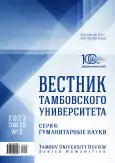Pedagogical possibilities of educational cooperation in the development of divergent thought of students
- 作者: Kochukova O.N.1
-
隶属关系:
- Administration of Ministry of Internal Affairs of Russia in Tambov Region
- 期: 卷 28, 编号 2 (2023)
- 页面: 247-257
- 栏目: PEDAGOGY OF HIGHER EDUCATION
- URL: https://bakhtiniada.ru/1810-0201/article/view/297983
- DOI: https://doi.org/10.20310/1810-0201-2023-28-2-247-257
- ID: 297983
如何引用文章
全文:
详细
Importance. Within the framework of the competence approach, the higher school faces the task of training specialists with non-standard, versioned, multivariate thinking, called divergent. However, the scientific and methodic support for the development of this type of thinking in the conditions of vocational training at the university has not been developed enough. Therefore, in order to determine the pedagogical conditions necessary for the development of the above-mentioned phenomenon and the development of technology for its development in the process of educational cooperation, it is necessary to determine the potential of educational cooperation available for the development of divergent thinking of university students.The purpose of the research is to study educational cooperation and its types to substantiate the possibilities of its use in the context of the development of divergent thinking of university students.Research methods. The content analysis of scientific literature on the research topic, generalization, systematization, structuring of information, the method of logical and semantic modeling are applied.Results and Discussion. Antagonistic factors influencing the development of divergent thinking of students (cooperation-competition, activity-passivity, motivation-demotivation) are identified and described. The analysis of the specifics of educational cooperation is carried out. A logical and semantic model of the typology of educational cooperation has been developed, reflecting the variety of forms and methods of organizing joint activities of interaction participants and the possibility of combining them. Based on the developed typology, the possibilities of educational cooperation for the development of divergent thinking of university students are considered.Conclusion. Educational cooperation contributes to the development of such basic characteristics of divergent thinking as flexibility, non-standard, variability, as well as abilities that ensure divergent productivity. Practical application of the obtained results is possible for the development of pedagogical conditions and technology for the development of divergent thinking of students in the process of educational cooperation.
作者简介
O. Kochukova
Administration of Ministry of Internal Affairs of Russia in Tambov Region
编辑信件的主要联系方式.
Email: olga-nek22@yandex.ru
ORCID iD: 0000-0002-7307-3265
Head of Organization of Psychological work Department of Personnel Management Department
31 Engelsa St., Tambov, 392002, Russian Federation参考
- Shteinberg V.E. (2015). Teoriya i praktika didakticheskoi mnogomernoi tekhnologii [Theory and Practice of Multi-Dimensional Teaching Technology]. Moscow, Public Education Publ., 350 p. (In Russ.) https://doi.org/10.17686/sced_rusnauka_2015-1626, https://elibrary.ru/uakfkj
- Makarova L.N., Kochukova O.N. (2022). Divergent thinking of students: categorical and conceptual analysis. Vestnik Tambovskogo universiteta. Seriya: Gumanitarnye nauki = Tambov University Review. Series: Humani-ties, vol. 27, no. 4, pp. 847-861. (In Russ.) https://doi.org/10.20310/1810-0201-2022-27-4-847-861, https://elibrary.ru/dvqbei
- Kochukova O.N. (2020). Pedagogicheskaya fasilitatsiya kak forma razvitiya divergentnogo myshleniya studen-tov [Pedagogical facilitation as a form of development of divergent thinking of students]. In: Makarova L.N. (executive ed.). Materialy 16 Mezhdunarodnoi nauchno-prakticheskoi Internet-konferentsii «Lichnostnoe i professional’noe razvitie budushchego spetsialista» [Proceedings of the 16th International Scientific and Practical Internet Conference “Personal and Professional Development of the Future Specialist”]. Tambov, Derzhavinskii Publishing House, pp. 194-200. (In Russ.) https://elibrary.ru/iykvai
- Kochukova O.N. (2022). Psikhologo-pedagogicheskaya kharakteristika ponyatiya «uchebnoe sotrudnichestvo» [Psychological and pedagogical characteristics of the concept of “educational cooperation”]. In: Makarova L.N. (executive ed.). Materialy 16 Mezhdunarodnoi nauchno-prakticheskoi Internet-konferentsii «Prepodavatel’ vysshei shkoly: traditsii, problemy, perspektivy» [Proceedings of the 16th International Scientific and Practical Internet Conference “High School Teacher: Traditions, Problems, Prospects”]. Tambov, Derzhavinskii Publishing House, pp. 38-44. (In Russ.) https://elibrary.ru/ooohuy
- Amabile T.M. (1996). Creativity in Context. Boulder, CO, Westview Press, 317 p. Available at: https://id.lib.harvard.edu/alma/990068774330203941/catalog (accessed 07.12.2022).
- Kurtzberg T.R. (2005). Feeling Creative, Being Creative: An Empirical study Diversity and Creativity in Teams. Creativity Research Journal, vol. 17, issue 1, pp. 51-65. https://doi.org/10.1207/s15326934crj1701_5
- Umbetova M.Zh., Umbetov A.U. (2021). Konstruktivnye osobennosti, sredstva i kriterii kollaborativnogo obu-cheniya [Design features, means and criteria of collaborative learning]. Sintez nauki i obrazovaniya v reshenii global’nykh problem sovremennosti [Synthesis of Science and Education in Solving Global Problems of our Time]. Ufa, Aeterna Publ., Issue 59, pp. 129-142. (In Russ.) https://elibrary.ru/cjnkbk
- Razumov V.I., Ryzhenko L.I., Sizikov V.P. (2015). Insafing – technology of interactive intellectual capacious communication. Vestnik Omskogo universiteta = Herald of Omsk University, no. 4 (78), pp. 94-100. (In Russ.) https://elibrary.ru/vcpbtb
- Altshuller G.S. (2022). Naiti ideyu: Vvedenie v TRIZ – teoriyu resheniya izobretatel’skikh zadach [Find an Idea: An Introduction to the TRIZ Theory of Inventive Problem Solving]. Moscow, Alpina Publ., 400 p. (In Russ.) Available at: http://www.bibliorossica.com/book.html?currBookId=9770 (accessed 07.12.2022).
补充文件









